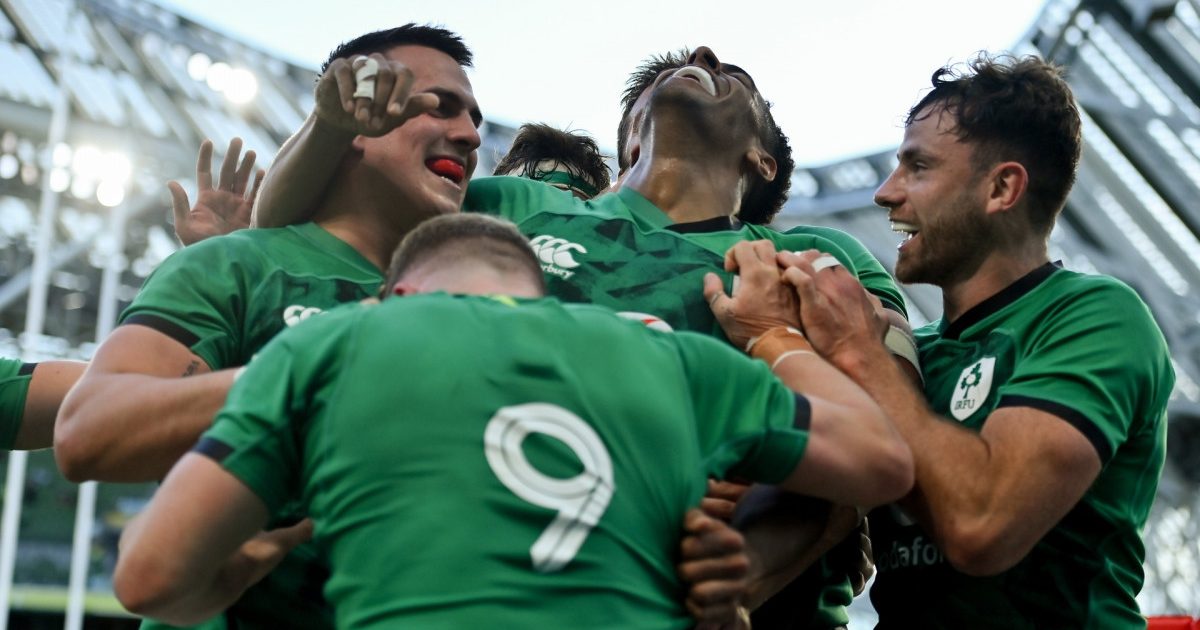Kelleher matches feat last seen 18 years ago as Ireland blitz USA

Ronan Kelleher claimed a record-equalling four tries and debutant Robert Baloucoune conjured a stunning solo score as an experimental Ireland team romped to a 71-10 win over the USA. Leinster hooker Kelleher became the first Irishman since Denis Hickie in August 2003 to ground four times in one match, with Brian Robinson and Keith Wood the only other men to achieve the feat in the green jersey.
Ulster wing Baloucoune, one of eight Test newcomers to feature for Andy Farrell’s men on Saturday evening, set the hosts on course to a comfortable ten-try Dublin success after bursting clear with a mesmerising run from halfway.
Provincial teammate and fellow debutant Nick Timoney was also on the scoresheet at the Aviva Stadium, along with Stuart McCloskey, Hugo Keenan, Gavin Coombes and Finlay Bealham, while Joey Carbery, Harry Byrne and Will Addison kicked 13, six and two points respectively.
The overawed USA faded fast from a promising start and a first-half penalty from Ireland-born No10 Luke Carty and a late converted Michael Baska try were a scant consolation. A gruelling experience for Gary Gold’s visitors was compounded by a 54th-minute red card for flanker Riekert Hattingh for ploughing his shoulder into Kelleher’s chin.
With a seven-man contingent on British and Irish Lions duty and captain Johnny Sexton among those rested for the summer series, head coach Farrell had been eager to grow competition looking forward to next season.
Greg O'Shea recalls some great times travelling with the Ireland sevens team…
– VIP access in Las Vegas ?
– Frat house parties in LA ?
– Surf open in Huntington beach ?@ChristinaMahonx @SimonZebo @ryanwilson89 #IrishRugby #LoveIsland pic.twitter.com/N2lUShJgrY— RugbyPass (@RugbyPass) July 8, 2021
He made eight personnel changes to the team which began last weekend’s entertaining 39-31 victory over Japan. Tom O’Toole and James Hume joined fellow Ulstermen Baloucoune and Timoney in making international bows, while Craig Casey, Ryan Baird and Coombes were afforded their first Test starts before Paul Boyle, Caolin Blade, Fineen Wycherley and Byrne made debuts from the bench.
A crowd of 6,000 – Ireland’s highest attendance since the outbreak of coronavirus – were treated to some free-flowing rugby which bordered on exhibition stuff in an increasingly one-sided encounter. Ireland initially struggled to get out of their own 22 in the opening stages but led 3-0 following their first foray forward courtesy of a Carbery penalty.
In contrast, the USA repeatedly turned down opportunities to kick for the posts in favour of testing the hosts’ defence from a series of lineouts, albeit without capitalising on their early dominance. That profligacy was swiftly pushed as Baloucoune stylishly announced himself on the international stage.
The pacy former sevens player collected a simple pass from Carbery just inside his own half, stretched his legs to weave away from a host of opposition players and then gleefully dived over in the right corner. Carbery added the extras before the visitors changed tack as Carty – an ex-Connacht academy player – opted to take the points from his next penalty opportunity to briefly reduce the arrears to 10-3.
Following their stuttering start, Ireland were beginning to build some momentum and duly put daylight between the sides on the scoreboard thanks to two almost-identical tries. Kelleher powered over from a maul, before Timoney produced a carbon copy just three minutes later, with Carbery maintaining his 100 per cent record with the boot.
The USA – beaten 43-29 by England at Twickenham last weekend – were fast looking like a tired tier-two side out of their depth and Ireland led 31-3 after just half an hour. Andrew Conway broke the line with a clever kick and chase to release Keenan, who duly teed up the onrushing Kelleher to claim his second score of the evening and leave Carbery with a straightforward conversion.
Conway was withdrawn from a head injury assessment at the break to be replaced by Addison, who returned for his first Ireland appearance in almost two years following an injury-ravaged period of his career. Ireland almost increased their stranglehold on the match within 30 seconds of the restart.
Caelan Doris charged down an attempted clearance from Ruben De Haas to burst clear but the American scrum-half recovered with a superb try-saving intervention. There was little time to enjoy the reprieve as star man Kelleher again capitalised on another rolling maul to complete his hat-trick.
The Ireland number two was making just his fourth Ireland start and, after briefly being floored by the challenge which caused Hattingh’s premature departure, swiftly recovered to ground his fourth score of a fruitful outing before being denied the chance to inflict further damage as he and Carbery were immediately removed for well-earned rests.
Centre McCloskey added to the American’s misery by touching down and then producing a perfectly weighted kick for Keenan to zoom clear and score minutes later. Farrell’s men were not done there. Having been denied what looked to be legitimate grounding by French referee, Mathieu Raynal, Coombes continued the dismantling with his maiden international try before Belham burrowed over to complete the scoring.
America made the scoreline slightly more respectful in between those tries thanks to a score from replacement Baska, which was converted by Will Magie, but they were comprehensively outclassed on an occasion to forget.
'It was probably the most disappointing call ever… I get counselling every four years when they announce it… it brings back the memories'@philmattie was nailed on for Lions selection, until he wasn't. He relives some painful memories w/ @heagneyl ???https://t.co/NwSr5YCm0t
— RugbyPass (@RugbyPass) June 20, 2021












































































